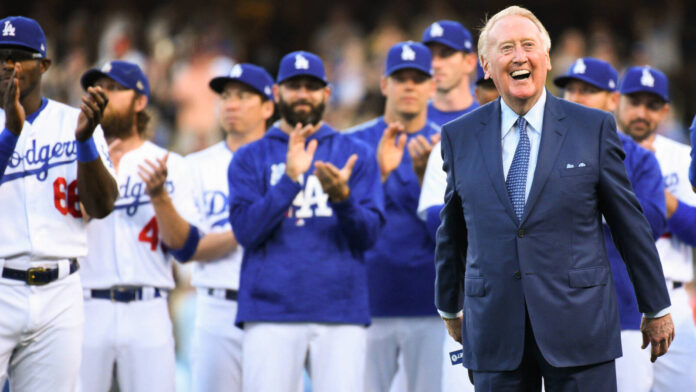It’s daunting trying to narrow down the 25 best baseball play-by-play voices in history. Many greats will be left out — sorry to Marty Brennaman or Milo Hamilton. We gave it a go and included some of the game’s more modern-day talent mixed with the all-time legends. Here we go, listed alphabetically.
Diamond Images/Getty Images
This is an alphabetical list, but there’s a case to be made for Allen residing at the top in terms of talent. “The Voice of the Yankees,” Allen called games for the famed franchise from 1947 to 1964, when he was fired without an official reason. Eventually, he returned to the Yankees’ television booth in 1977 until ’85. The first voice of the popular This Week in Baseball, Allen was known for his most notable catchphrase, “How a-bout that?!” Allen was one of the first two winners of the Baseball Hall of Fame’s Ford C. Frick Award, given annually for a broadcaster’s “major contributions to baseball.”
2 of 24
Walter ‘Red’ Barber
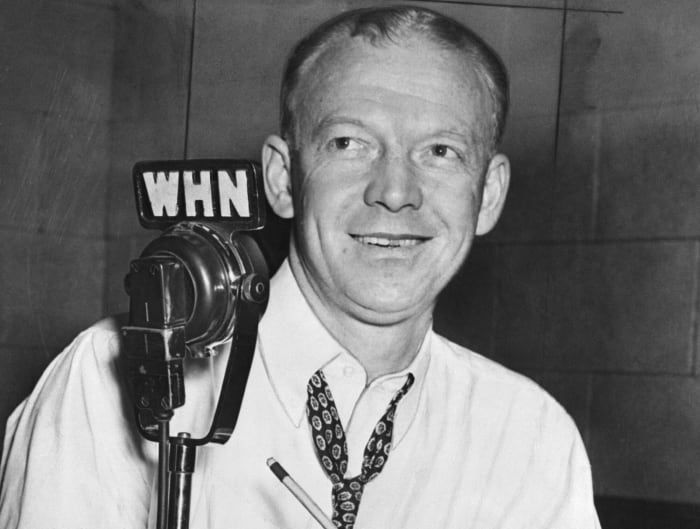
Bettmann/Contributor/Getty Images
Barber joined Allen as the first winners of the Ford C. Frick Award. Broadcasting from the “Catbird Seat,” Barber’s career began in Cincinnati in 1934 and ran through ’38. However, Barber’s greatness on the microphone took shape as the “Voice of the Dodgers” in Brooklyn for 15 years, starting in 1939. From there, he spent 13 years calling Yankees’ games from 1954-66. Notable Barber quips included “can of corn” to describe an easy fly ball catch and “they’re tearin’ up the pea patch” to reference a winning streak.
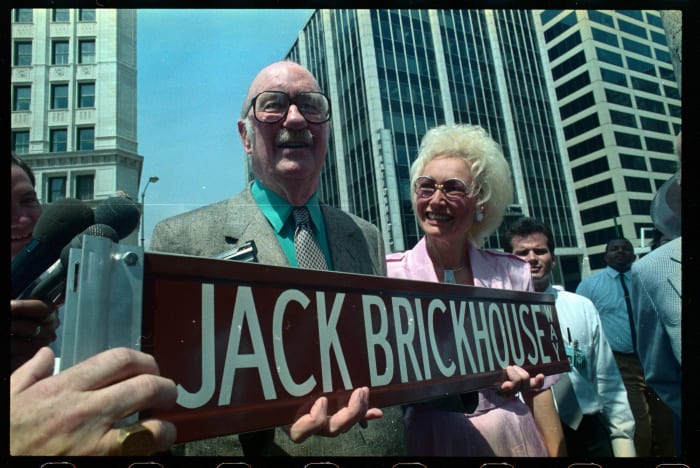
Bettmann/Contributor/Getty Images
Brickhouse’s broadcasting career began at age 18 in his hometown of Peoria, Ill. He eventually made his way northeast to the big city of Chicago. Brickhouse is best known for calling Cubs games, notably on WGN-TV from 1948-81, but he was the play-by-play voice of the crosstown rival White Sox for a spell. He covered three World Series nationally for NBC, called Chicago Bears’ games (1953-77) on radio, and did play-by-play for the Chicago Bulls on WGN-TV from 1966-73. Brickhouse was a 1983 recipient of the Frick Award.
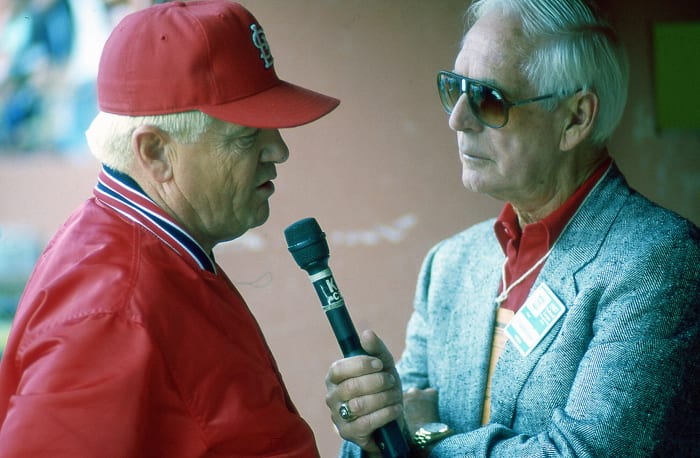
Owen C. Shaw/Getty Images
Interestingly enough, Buck’s career in the St. Louis Cardinals‘ broadcast booth came as a color commentator, partnering with the iconic Harry Caray (more on him in a bit). When the 1970s dawned, Buck took over those play-by-play duties and held them into the 1990s. In addition to his legendary work with the Cardinals, Buck also called national Major League Baseball games and the World Series for various networks. Plus, he was the voice of several Super Bowls, notably for CBS Radio. A Frick Award winner, Buck is also a member of the National Radio Hall of Fame and the NAB Broadcasting Hall of Fame.
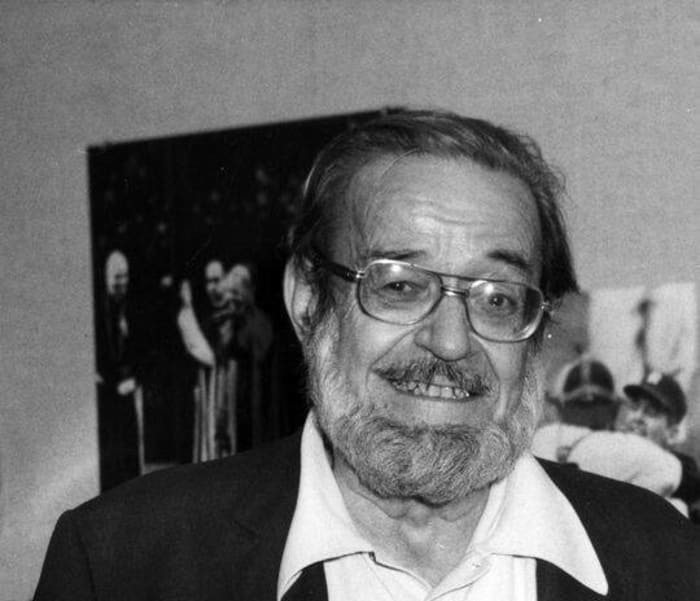
National Baseball Hall of Fame and Museum
Canel’s name might be unfamiliar to even the most knowledgeable baseball fans. To Spanish-speaking baseball fans of a generation, Canel was a broadcast icon. Beginning in 1937, Canel called 42 World Series for NBC and was the Spanish language voice of the New York Yankees. In addition to baseball broadcasting talent, Canel was a correspondent for The Associated Press, among other international news agencies. He was honored with Frick Award in 1985.
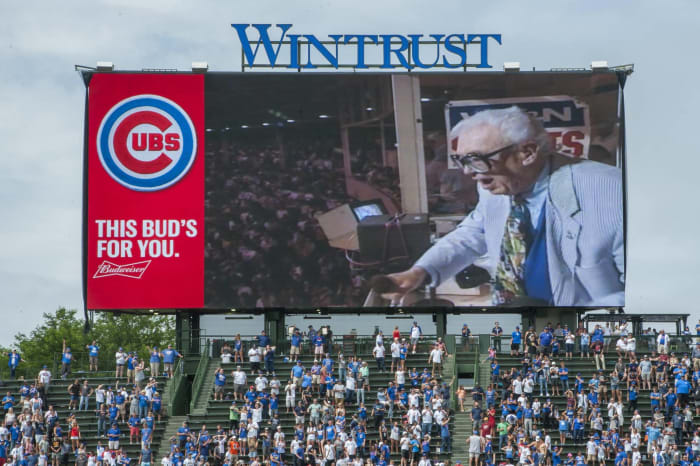
Patrick Gorski/USA TODAY Sports
When it comes to the great characters of the broadcast booth, there really aren’t many greater than Harry Caray. He was known for his pop-bottle-sized glasses, downing a few pops while calling a game, shouting “Holy Cow!” after a long ball, and calling a game from Wrigley Field’s famed bleachers without a shirt. Beginning in 1945, Caray was the voice of the St. Louis Cardinals for 25 years. Following a brief stint in Oakland, Caray spent 11 years calling Chicago White Sox games, usually arguing with partner Jimmy Piersall, before his final 16 as the beloved voice of the Chicago Cubs. A Frick Award recipient, Caray’s son, Skip, and grandson, Chip, followed in his MLB play-by-play footsteps.

Erik Williams/USA TODAY Sports
We’ll give the great Bob Costas a pass for calling Cleveland pitcher Shane Bieber “Justin Bieber” during the ALDS in 2022. A 22-time Emmy Award winner, Costas is one of the more versatile broadcasters in the business. Though he’s brilliantly calling MLB for TBS and MLB Network, Costas’ baseball broadcasting career is probably best known for being the voice of NBC’s Saturday Major League Baseball Game of the Week during the 1980s (it was Costas on the call for the memorable 1984 Cardinals-Cubs contests, better known as “The Sandberg Game”). Costas also provided play-by-play for ESPN’s weeknight coverage during the 1990s. He was a 2017 recipient of the Frick Award.
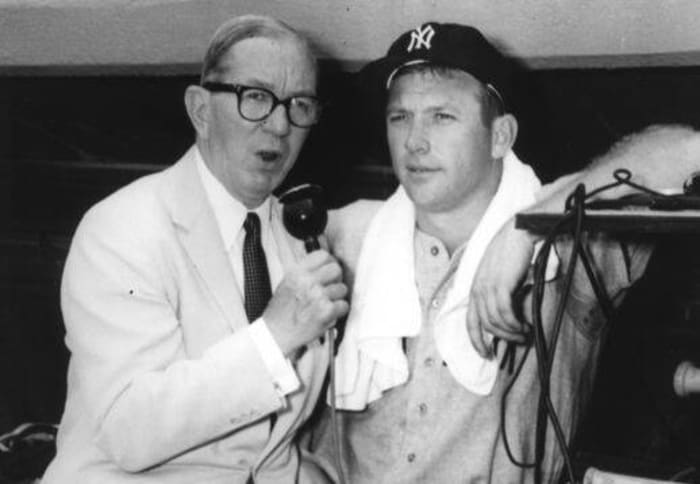
National Baseball Hall of Fame and Museum
Known as “The Commander” for his ability to intelligently take control of the game from a descriptive standpoint, Elson was the play-by-play voice of both the Chicago Cubs and White Sox beginning in 1929. A pretty impressive feat when thinking about it. However, from 1946-70, Elson solely called White Sox games. In addition, Elson spent the 1971 season announcing games for the Oakland A’s, called nine MLB All-Star Games and 12 World Series, and was credited with conducting the first on-field interview alongside Connie Mack in 1931. A 1979 Frick Award winner, Elson is considered a true pioneer of the business.
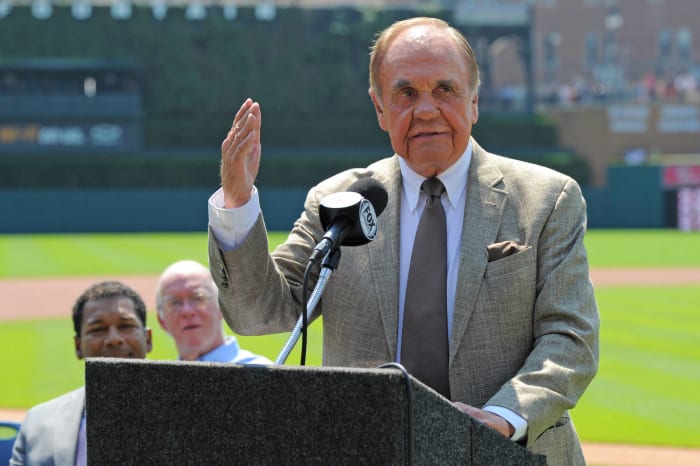
Patrick Gorski/USA TODAY Sports
Name the sport and the great Dıck Enberg has called it. College basketball and NFL might be what sports fans, particularly during the 1980s and ’90s, remember most about Enberg’s exceptional broadcasting career. Yet, listening to Enberg’s reaction to becoming the 39th winner of the Frick Award, one would think the career of a 14-time Emmy Award winner was complete. “In a way, I accept this honor today as saying, ‘Hey, Enberg, you hit a grand slam,” he told the National Baseball Hall of Fame and Museum. Enberg called California Angels games from 1968-78 and national postseason broadcasts on NBC. In 2010, he served as the play-by-play voice of the San Diego Padres. “Oh, my!”
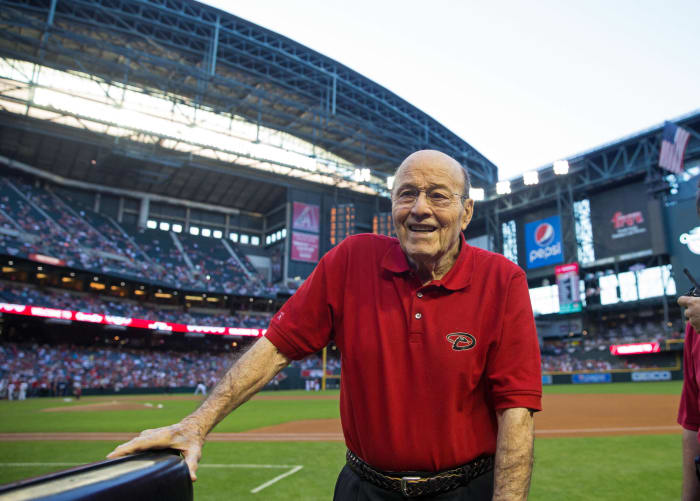
Mark J. Rebilas/USA TODAY Sports
It typically seems former players find broadcast success as analysts. However, Garagiola blossomed into one of the great play-by-play announcers the game would find while also providing color commentary. According to legend, Garagiola became interested in broadcasting when he spent time in the St. Louis Cardinals’ booth while dealing with an injury during the 1950 season. In 1954, he became part of the Cardinals’ broadcast team. From there, his sensible, folksy approach, fun banter, and stories of his playing days were appreciated while announcing the Major League Baseball Game of the Week, All-Star Games, and World Series for NBC. Garagiola, who also called games for the Yankees, Angels, and Diamondbacks, was the 1991 recipient of the Frick Award.
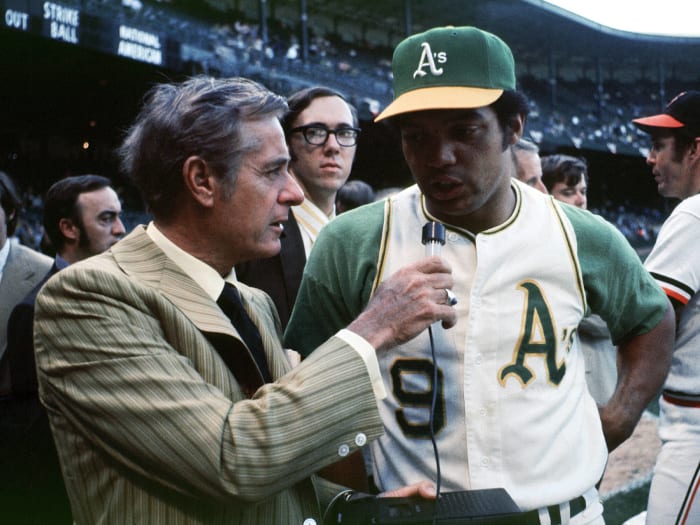
Kidwiler Collection/Diamond Images/Getty Images
The legendary Gowdy might have gotten his start calling six-man football in Wyoming, but from 1951-66, he was the man behind the microphone for the Boston Red Sox. Honesty, enthusiasm, and humor were all part of Gowdy’s broadcasts — notably when he called NBC’s Major League Baseball Game of the Week for 10 seasons, spanning the late 1960s and into the ’70s. A Peabody and Frick Award winner, Gowdy called 13 World Series and 16 All-Star Games. And he was one of the highlights from the forgotten 2001 Freddie Prinze Jr. vehicle Summer Catch.
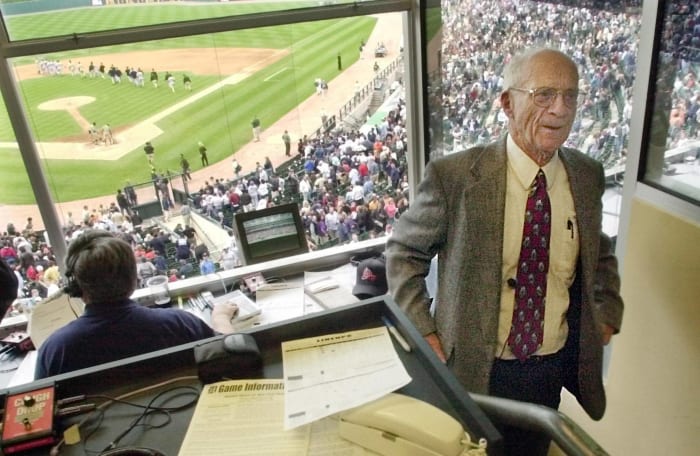
Carlos Osorio/AFP via Getty Images
Before his legendary run calling games for the Detroit Tigers, which started in 1960, Harwell provided play-by-play for the New York Giants and Baltimore Orioles. He actually called Bobby Thomson’s historic homer against the Dodgers in the 1951 playoffs on the first coast-to-coast telecast in the United States. However, Harwell’s 42 years in the Tigers’ booth — radio and television — earned him his legendary status beyond the realm of Detroit baseball.
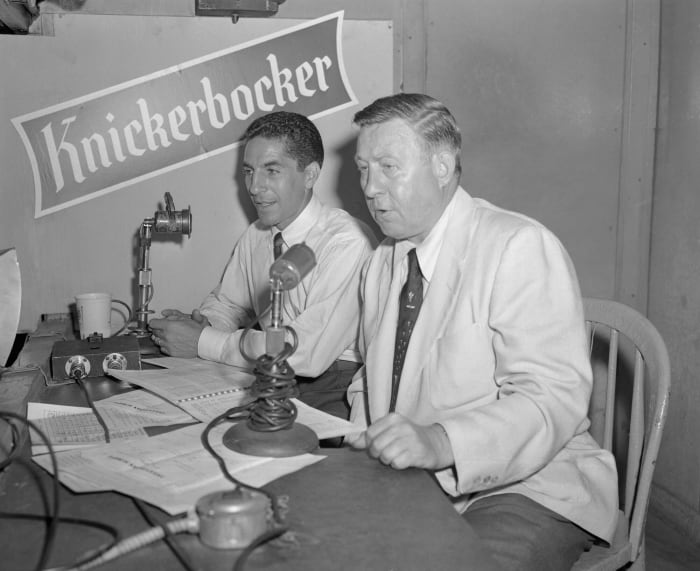
Bettmann/Contributor
Talk about seeing and calling it all. One of the earliest recipients of the Frick Award, Hodges began his broadcasting career in 1929 and called games for the Cincinnati Reds, Chicago Cubs, and Washington Senators, and he teamed with Mel Allen in the Yankees booth. However, Hodges is likely best remembered as the voice of the Giants (beginning in 1949) while they played in New York and San Francisco. Who can forget his call after Bobby Thomson’s homer to beat the Dodgers in the 1951 playoffs? “The Giants win the pennant, the Giants win the pennant …” An instant classic if there ever was one.
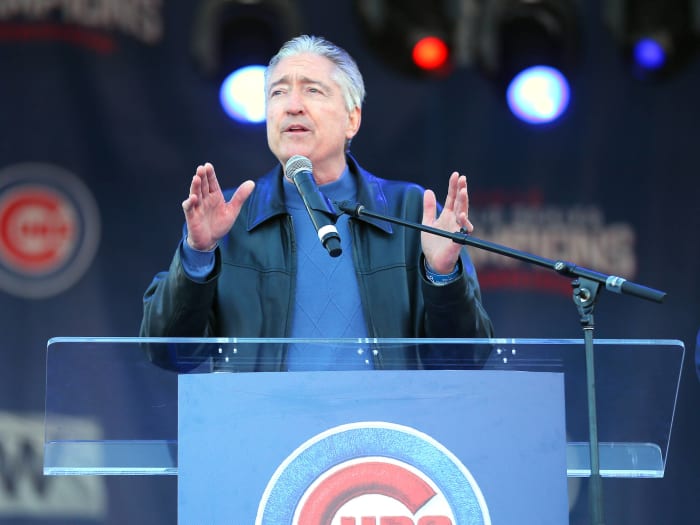
Dennis Wierzbicki/USA TODAY Sports
In 2022, Hughes celebrated his 40th straight season announcing Major League Baseball. That career began in 1983, doing play-by-play for the Minnesota Twins. From there, Hughes spent 12 years as the TV/radio voice for the Milwaukee Brewers. However, since 1995, Hughes has been called Chicago Cubs games — for years with beloved analyst Ron Santo — on radio, where his scholarly intelligence of the game, dry sense of humor, and descriptive tones are why he’s a member of the Chicago Cubs Hall of Fame and was a 2016 finalist for the Frick Award.
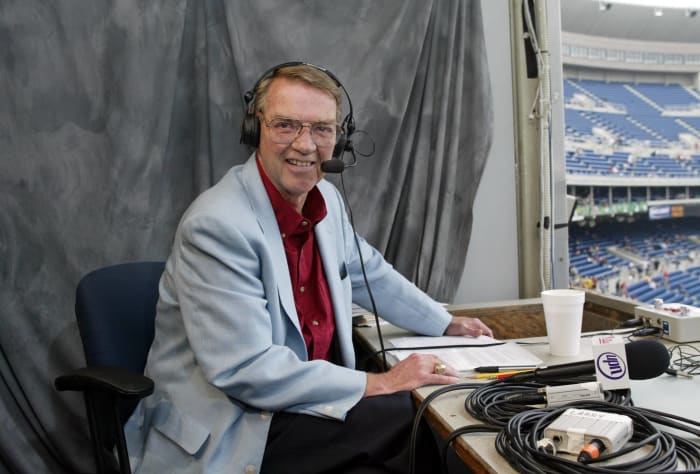
Hunter Martin/Getty Images
Kalas had a durably smooth voice. It was made for inflection and just so easy to listen to. While he was one of the more underrated football voices (notably Notre Dame and those popular ALCOA “Fantastic Finishes” clips), Kalas’ true calling was baseball. He was the first voice of the Houston Astros in 1965. In ’71, he found a home in the Philadelphia Phillies‘ booth. Teamed with the great Richie Ashburn, Kalas called more than 5,000 Phillies games, was named Pennsylvania Sportscaster of the Year 18 times, and was honored as Frick Award winner in 2002.
16 of 24
Duane and Glen Kuiper
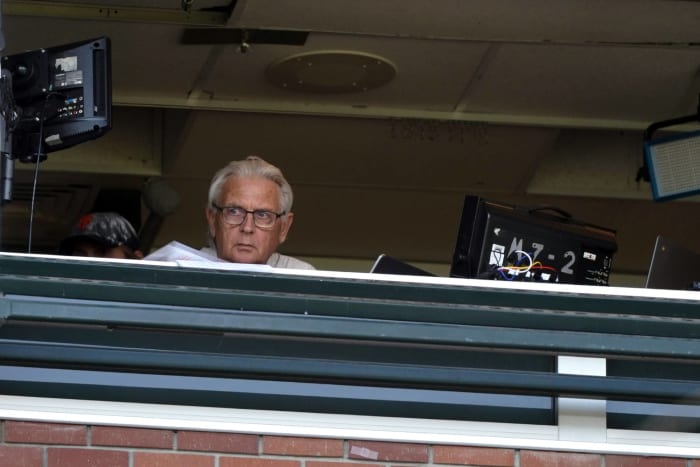
Darren Yamashita/USA TODAY Sports
Yes, we’re going with a twofer of Bay Area broadcasting greats who happen to be brothers. Duane, a former infielder with Cleveland and San Francisco, has been calling Giants’ games since 1986 — minus his 1993 campaign in Colorado — and he’s best known for working with stellar partner Mike Krukow. After missing most of the 2021 season following a cancer diagnosis, the deep-voiced Duane picked up the mic again in 2022. Glen , meanwhile, has been across the bay working Oakland Athletics‘ broadcasts since 2004 and has served as the primary voice of the club since 2006. They may not be flashy, but each poses a sensational dry wit and presents an enjoyable broadcast.
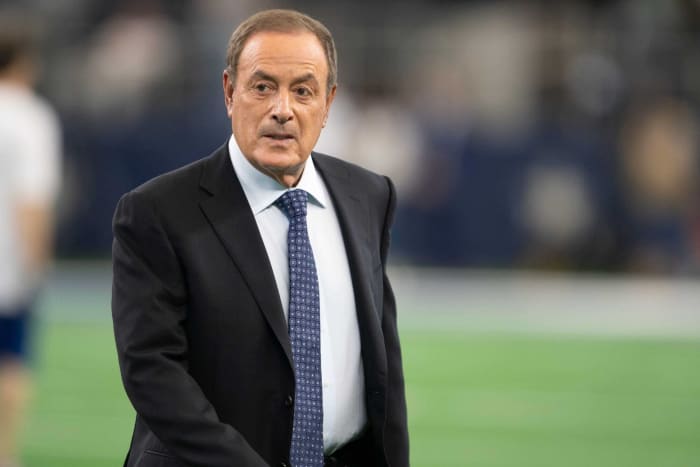
Jerome Miron/USA TODAY Sports
When it comes to modern-day versatility, Michaels is a true gem. Whether his decades calling NFL action or memorable play-by-play of the United States’ stunning hockey upset of the Soviet Union at the 1980 Olympics, Michaels is an undisputed legend. However, his baseball work might get lost amid all the greatness. He’s called multiple World Series and memorably exuded calmness during the 1989 Bay Area series interrupted by the devastating Loma Prieta earthquake . A 2021 Frick Award winner, Michaels’ MLB broadcast career began with the Cincinnati Reds in 1971. He called San Francisco Giants games later that decade before moving on to national duties with ABC and NBC.
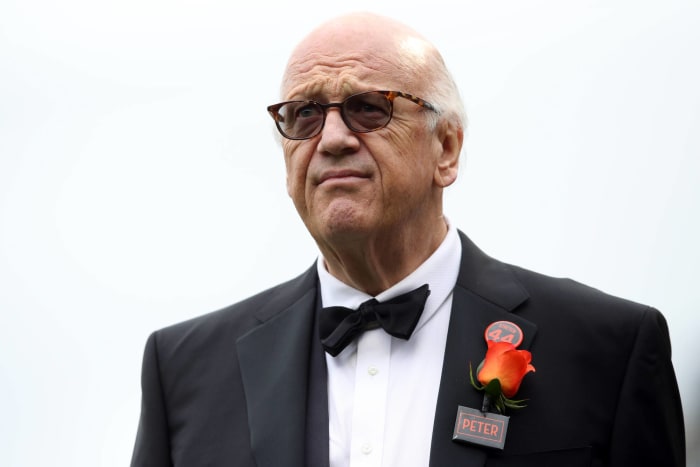
Darren Yamashita/USA TODAY Sports
When it comes to conversational baseball broadcasting, not many do it better than Miller . A San Francisco native, Miller has been the Giants’ play-by-play voice since 1997. Before that, Miller lent his brilliant play-by-play talent to the Oakland A’s, Texas Rangers, Boston Red Sox, and Baltimore Orioles. He also called NBC’s Major League Baseball Game of the Week and spent 20 years as the voice of ESPN’s Sunday Night Baseball. Miller won the Frick Award in 2010.
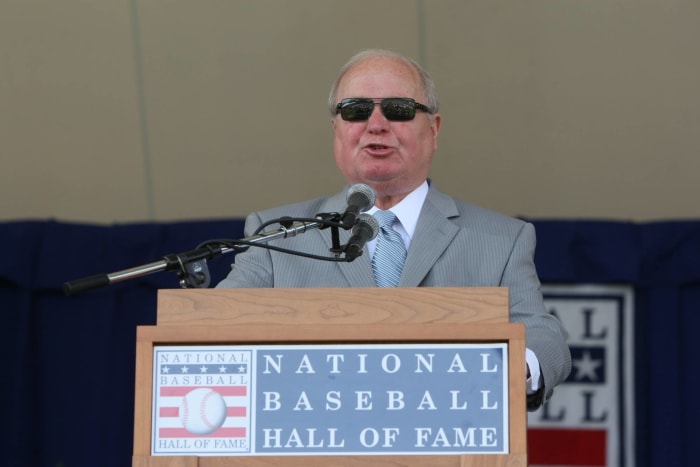
Rich Pilling/MLB via Getty Images
A 2008 recipient of the Frick Award, Niehaus should be one of the first people that comes to mind when thinking or talking about Seattle Mariners baseball. He was the play-by-play voice of the club from its very first major-league season in 1977 until his death in November 2010 from a heart attack. As the legend goes, Niehaus was the first person to dub Alex Rodriguez “A-Rod.” Among his beloved catchphrases is, “Get out the rye bread and mustard, Grandma, it is grand salami time!”
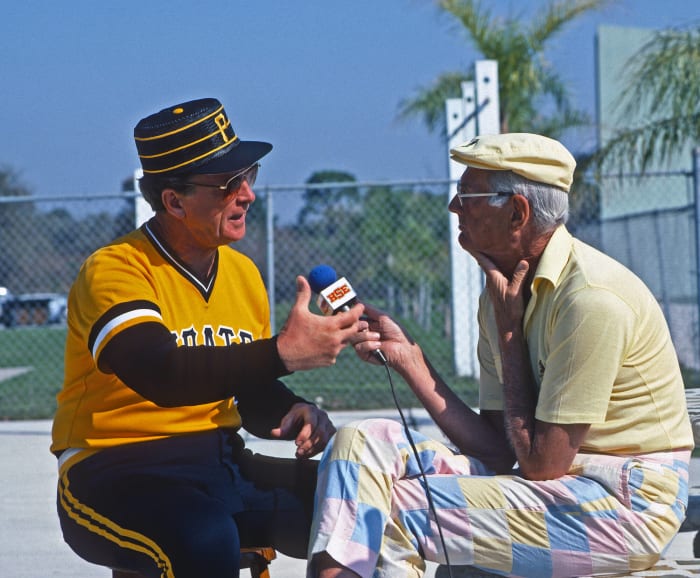
George Gojkovich/Getty Images
Perhaps better known as “The Gunner.” When it comes to Pittsburgh sports broadcasting history, Prince might be the king. He spent 28 years, beginning in 1948, calling Pirates baseball. He also was the first play-by-play voice of ABC’s Monday Night Baseball and called three World Series and the 1965 All-Star Game for NBC. Known for his rapid-fire delivery and colorful banter, the Frick Award winner would chime when the Pirates needed to rally from two runs down with, “We need a bloop and a blast!“
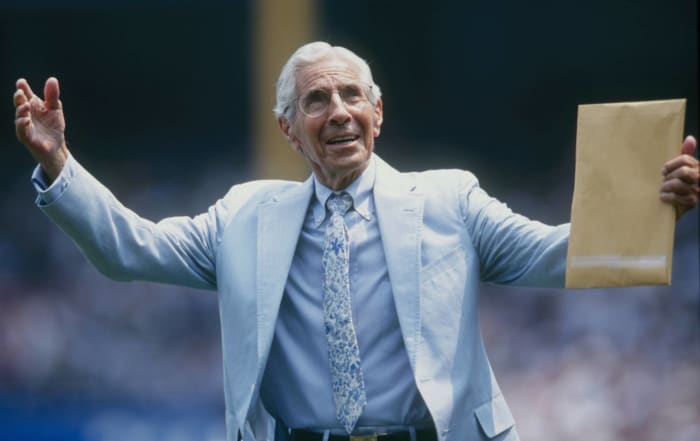
Vincent Laforet/Getty Images
Let’s just get it out of the way right now. Rizzuto could be a homer for his beloved New York Yankees. But so was Ken “Hawk” Harrelson for the Chicago White Sox, who has actually won a Frick Award. And, yes, Rizzuto would leave broadcasts early due to traffic or inclement weather. But all Rizzuto’s quirks might be what fans of “The Scooter’s” style, mannerisms, and honesty appreciated most. Following his Hall-of-Fame playing career, Rizzuto spent roughly 40 years broadcasting Yankees games in various capacities, and his voice can be heard in the Meat Loaf classic “Paradise by the Dashboard Light.” “Holy Cow!”
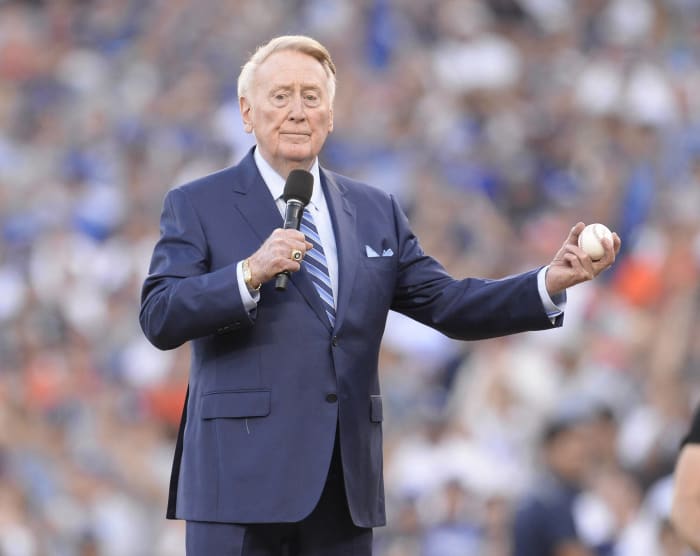
Gary A. Vasquez/USA TODAY Sports
Vin Scully was simply the best. A disciple of Red Barber, when he joined the aforementioned legend in the Brooklyn Dodgers booth in 1950. Eight years later, when they moved to Los Angeles, Scully relocated with the Dodgers. But, obviously, he was more than just the “Voice of the Dodgers.” He was a longtime staple on national baseball broadcasts — on hand to call the likes of Hank Aaron’s 715th home run and Kirk Gibson’s winning home run in Game 1 of the 1988 World Series. The National Baseball Hall of Fame and Museum list some adjectives to describe Scully and his broadcast style. A few that stand out are “entertaining,” “proficient,” “friendly,” “well-prepared,” and “colorful.”
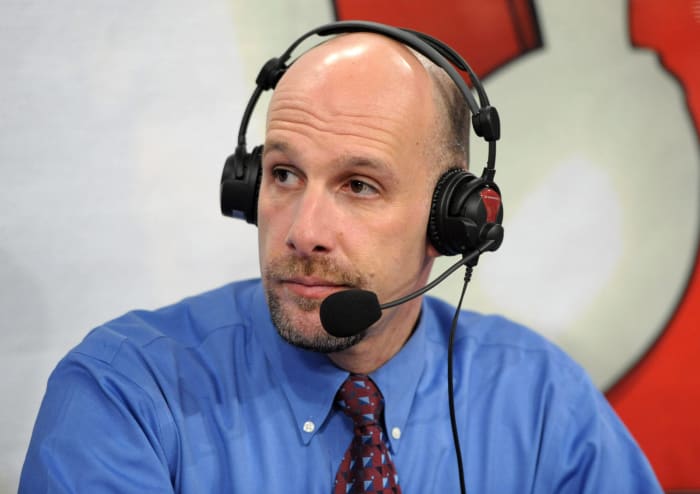
Kirby Lee/USA TODAY Sports
A Toronto native, Shulman is one of the more unheralded voices on today’s MLB scene. And perhaps an outside-of-the-box choice to be on this list. Still, when it comes to current baseball play-by-ball talent, Shulman is one of the best. In 1995, he became the voice of the Toronto Blue Jays for TSN, then started calling baseball for ESPN in the early 2000s. He called Barry Bonds’ 754th home run and delivered word of the death of Osama Bin Laden for the network. A former voice of ESPN’s Sunday Night Baseball, Shulman, also a fantastic college basketball announcer for ESPN, is back calling games for the Blue Jays on Sportsnet.
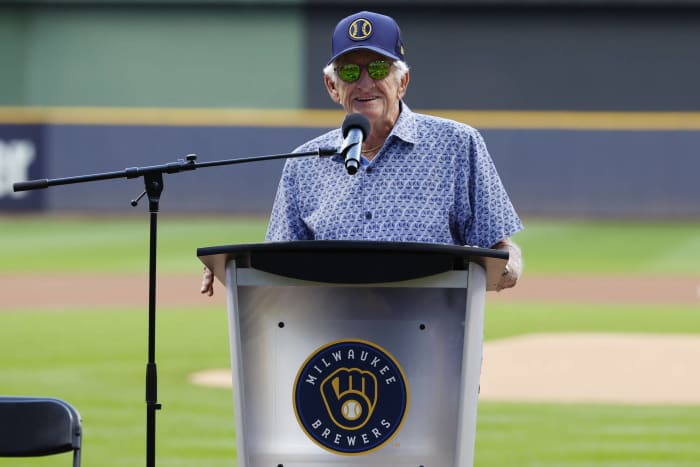
Jeff Hanisch/USA TODAY Sports
Talk about characters. The thing about Uecker is, while he’s known for those funny Miller Lite commercials, his starring role on Mr. Belvedere, or stealing the show as Harry Doyle in the Major League franchise of films, he’s completely professional in the broadcast booth. Uecker has been an integral part of Milwaukee Brewers’ broadcasts since the early 1970s but also was a staple on ABC’s national baseball coverage during the 1970s and ’80s. Uecker won the Frick Award in 2003.
A Chicago native, Jeff Mezydlo has professionally written about sports, entertainment and pop culture for nearly 30 years. If he could do it again, he’d attend Degrassi Junior High, Ampipe High and Grand Lakes University.

